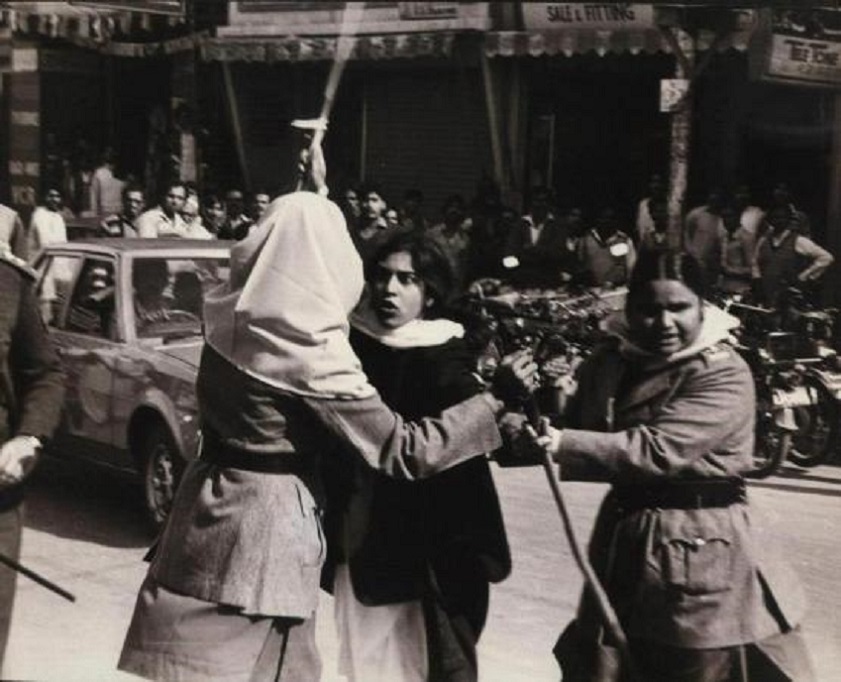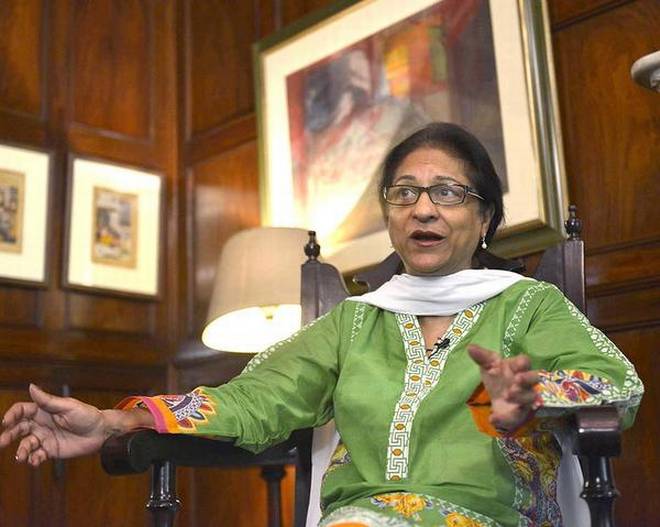Asma Jahangir
This is a collection of articles archived for the excellence of their content. |
Contents |
A brief profile
Born in Lahore on January 27, 1952, Ms. Jehangir had a prominent career both as a lawyer and a rights activist. After obtaining a law degree from the Punjab University in 1978, she started her career as an advocate at the judiciary.
She soon became a champion democracy activist and was subsequently imprisoned in 1983 for participating in the Movement for the Restoration of Democracy against the military rule of Zia-ul-Haq.
She braved death threats, beatings and imprisonment to win landmark human rights cases while standing up to dictators.
The Human Rights Commission of Pakistan, which she helped create, made its name defending religious minorities and tackling highly charged blasphemy accusations along with cases of “honour” killings.
“There was a time that human rights was not even an issue in this country... Women’s rights was thought of as a Western concept. Now people do talk about women’s rights — political parties talk about it, even religious parties talk about it,” she once said.
She often defended minority Christians charged with blasphemy, an offence that carries the death penalty. She was repeatedly threatened by the country’s militant religious right whom she criticised loudly and often.
A life lived for noble causes
Zaheer Babar, February 11, 2018: The Washington Post
Born on Jan. 27 in 1952, Jehangir had a prominent career both as a lawyer and rights activist.
She has served as chairwoman of the Human Rights Commission of Pakistan, and was widely respected for her outspoken criticism of the country’s militant and extreme Islamist groups and unparalleled record as rights activist.
Jehangir also served as president of the Supreme Court’s Bar Association and was a U.N. rapporteur on human right and extrajudicial killings.
She was on Time magazine’s list of 100 most influential women.
A fierce defender of democracy, she often criticized Pakistan’s military and intelligence. She defended minority Christians charged with blasphemy, an offense that under Pakistan’s controversial law carries the death penalty.
She was repeatedly threatened by the country’s militant religious right whom she criticized loudly and often.
A champion of human rights, Jehangir was unafraid to speak loudly against those attacking minority religions and women. She won scores of international awards. Several years ago, she briefly sent her family out of the country following threats from militant groups.
Early life
Asma Jahangir was born on 27 January 1952, and earned a B.A. from Kinnaird College, Lahore, followed by a law degree in 1978 from Punjab University. Born into a politically active family, her activism began at a young age when she protested against the military government for detaining her father for opposing dictatorship.
Campaigning against discriminatory laws and defending the disadvantaged In 1980, Jahangir and 3 of her fellow women lawyers got together to form AGHS Law Associates, the first law firm established by women in Pakistan. In 1981, Jahangir supported the Women’s Action Forum (WAF), a group that began campaigning against Pakistani laws that discriminated against women, most notably against the proposed Law of Evidence, where the value of a woman’s testimony would be reduced to half that of a man’s testimony, and the Hudood Ordinances, where victims of rape had to prove their innocence or else face punishment themselves. In 1983, Jahangir led a protest march in Lahore against a decision by then President Zia-al Haq to enforce religious laws.
While protesting against the draft Law of Evidence in 1983, Jahangir and others were beaten, tear-gassed and arrested by the police. Undaunted, in the same year, Jahangir protested against a judgment where a blind, 13 year old girl, who had been raped by her employers, had been accused of zina (fornication) and had been sentenced to three years of imprisonment and flogging. The verdict was overturned following the protests. Subsequently, Jahangir was placed under house arrest and then imprisoned for opposing Zia’s Islamisation policy.
As Pakistan lacks a national human rights institution, Jahangir was one of the founder members of the Human Rights Commission of Pakistan, an independent NGO, which was established in 1986. She has subsequently served as both Secretary General and Chairperson of this eminent institution, which promotes and defends human rights in Pakistan, as well as monitoring human rights violations. The Commission has taken up contentious issues including violence against women, honour-killing, abolishment of capital punishment and religious violence.
Jahangir is a strong proponent of protecting the rights of persecuted religious minorities in Pakistan and speaks out against forced conversions. In 1995, after she had defended a 14-year old Christian boy – Salamat Masih, accused of blasphemy and sentenced to death – a mob outside the Lahore High Court smashed her car window and assaulted her driver. Jahangir and her family have been attacked, taken hostage, had their home broken into and received death threats ever since. Jahangir and her team continued to work on the case and Salamat Masih was acquitted.
Achievements
Ms. Jehangir served as president of the Supreme Court’s Bar Association and was a UN rapporteur on human right and extrajudicial killings. She was once on Time magazine’s list of 100 most influential women.
International work and other achievements
Besides her work in Pakistan, Asma Jahangir has promoted human rights internationally through her long service with the United Nations. She was UN Special Rapporteur on Extrajudicial, Arbitrary or Summary Executions from 1998 to 2004, and UN Special Rapporteur on Freedom of Religion and Belief from 2004 to 2010.
Jahangir has authored two books: Divine Sanction? The Hudood Ordinance and Children of a Lesser God: Child Prisoners of Pakistan. She has received numerous awards including the Martin Ennals Award for Human Rights Defenders and the Ramon Magsaysay Award, both in 1995, and the coveted Hilal-i-Imtiaz – the second highest civilian award and honour given by the Government of Pakistan – in 2010. The esteem in which Asma Jahangir is held among her fellow lawyers in Pakistan is evidenced by her election as the first female President of the Supreme Court Bar Association, the apex body of lawyers in Pakistan, in 2010.
Confronting dictatorship
Pakistan’s iron lady was a fierce opponent of dictatorships
Asma Jehangir was the country’s symbol of human rights and resistance and a fierce opponent of military dictators for over four decades. She was also a vocal advocate of India-Pakistan peace and was part of several ‘Track 2’ delegations to India.
Ms. Jahangir has also taken up cases of missing persons and fought in the courts for their recovery free of cost. She played an active role in the famous lawyers’ movement in 2007 to restore Iftikhar Chaudhry as the Chief Justice of Pakistan. The movement later brought the fall of then President Gen. Pervez Musharraf.
Of late, she had been critical of the Supreme Court for its ‘judicial activism’ and had also criticised the apex court for disqualifying Nawaz Sharif from the office of Prime Minister in July last year. She won numerous national and international awards for her struggle for the oppressed including the highest civilian honours Hilal-i-Imtiaz and Sitara-i-Imtiaz.
Providing free legal aid and advancing women’s rights
Since 1986, Jahangir and her associates at AGHS’ Legal Aid Cell, have taken on several cases involving women, children and bonded labourers. It also established a shelter for women, called ‘Dastak’. Dastak is now an independent trust run jointly by civil society organisations in Pakistan.
In 1996, the Lahore High Court ruled that an adult Muslim woman could not get married without the consent of her male guardian. Women who chose their husbands independently could be forced to annul their marriages and Jahangir, who frequently took on such cases, highlighted the repercussions. She has been able to secure the release from prison of several women accused of adultery or “immoral” sexual behaviour.
In 1999, Jahangir took up the case of Saima Sarwar, who was given shelter at Dastak after leaving her husband and seeking a divorce. Sarwar was subsequently murdered in an act of honour-killing that took place in Jahangir’s offices, highlighting the immense risks involved in taking on these sorts of cases in Pakistan.
In May 2005, Jahangir helped to organise a symbolic mixed-gender marathon in Lahore to raise awareness about violence against sports women by religious extremists. Islamist groups armed with firearms, batons and Molotov cocktails violently opposed the event and Jahangir was publicly beaten, stripped and detained by the police.
More recently, Asma Jahangir was, in November 2007, one of 500 lawyers, opposition politicians and human rights activists detained when President Musharaff declared a state of emergency. She remained under house arrest for three months.

